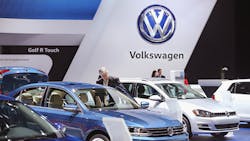Europe’s factories saw export growth stagnate this month as the economy feels the pinch from the global trade war that’s continuing to ratchet up.
The auto industry -- targeted by President Donald Trump -- is taking the brunt of the slowdown in demand, according to IHS Markit’s latest monthly survey. Overall manufacturing in the euro area grew the slowest pace in two years in September and new export orders failed to rise for the first time since 2013.
Markit’s comments echoes concerns voiced by European car manufacturers, who are particularly vulnerable to sustaining collateral damage in the trade-war salvos between the U.S. and China. But there are broader effects, with the OECD saying this week that global growth may have hit a plateau.
That warning came the same week that the U.S.-China trade war deepened, with Beijing saying it will retaliate against President Donald Trump’s order for more tariffs on imports from the Asian nation.
Trade tensions are “a real and true concern for our business because we’re always thinking of long-term cycles,” Daimler AG CEO for trucks Martin Daum said in a Bloomberg Television interview on Sept. 19. “We depend on long-term stability.”
Automakers are Europe’s worst performing sector over the past six months, down more than 10%, versus a 2% gain for the Stoxx 600 Index.
In China, car sales dropped for a third straight month in August, as slowing economic growth are threatening to end the vehicle market’s almost three-decade expansion.
“The problem in China is the sentiment,” Klaus Rosenfeld, CEO at a German industrial and autoparts supplier Schaeffler Group, said. “There is negative sentiment, and I think the trade war, the tariff discussion fuels this.”
Trade tensions are hanging over the whole industry, from trucks to luxury sports vehicles, with Ferrari NV CEO Louis Camilleri telling analysts on an earnings call this week that he hopes that “rationality would prevail,” because a “tariff war between Europe and U.S. would be quite dramatic.”
And weaker demand for cars will have a fallout on other manufacturers. In Markit’s survey for France -- home to Peugeot and Renault -- it said “anecdotal evidence suggested that many manufacturers saw a reduction in demand from the automotive sector.”
In September, the weakness in the euro-area PMI was all due to manufacturing, with the measure for services rising to a three-month high. Markit said the combined index points to a quarterly expansion of about 0.5%.
But, according to Markit Chief Business Economist Chris Williamson, weaker readings for backlogs and exports means “the risks to future growth appear tilted to the downside.” There’s also the turmoil in emerging markets, which is affecting sentiment more broadly.
“While the U.S.-EU dispute has been contained, uncertainty stemming from the global unrest continues to weigh on European manufacturers,” said Bert Colijn, an economist at ING. “Large emerging trade partners are struggling with depreciated currencies, limiting European export potential.”
By Marcus Bensasson
About the Author
Bloomberg
Licensed content from Bloomberg, copyright 2016.
